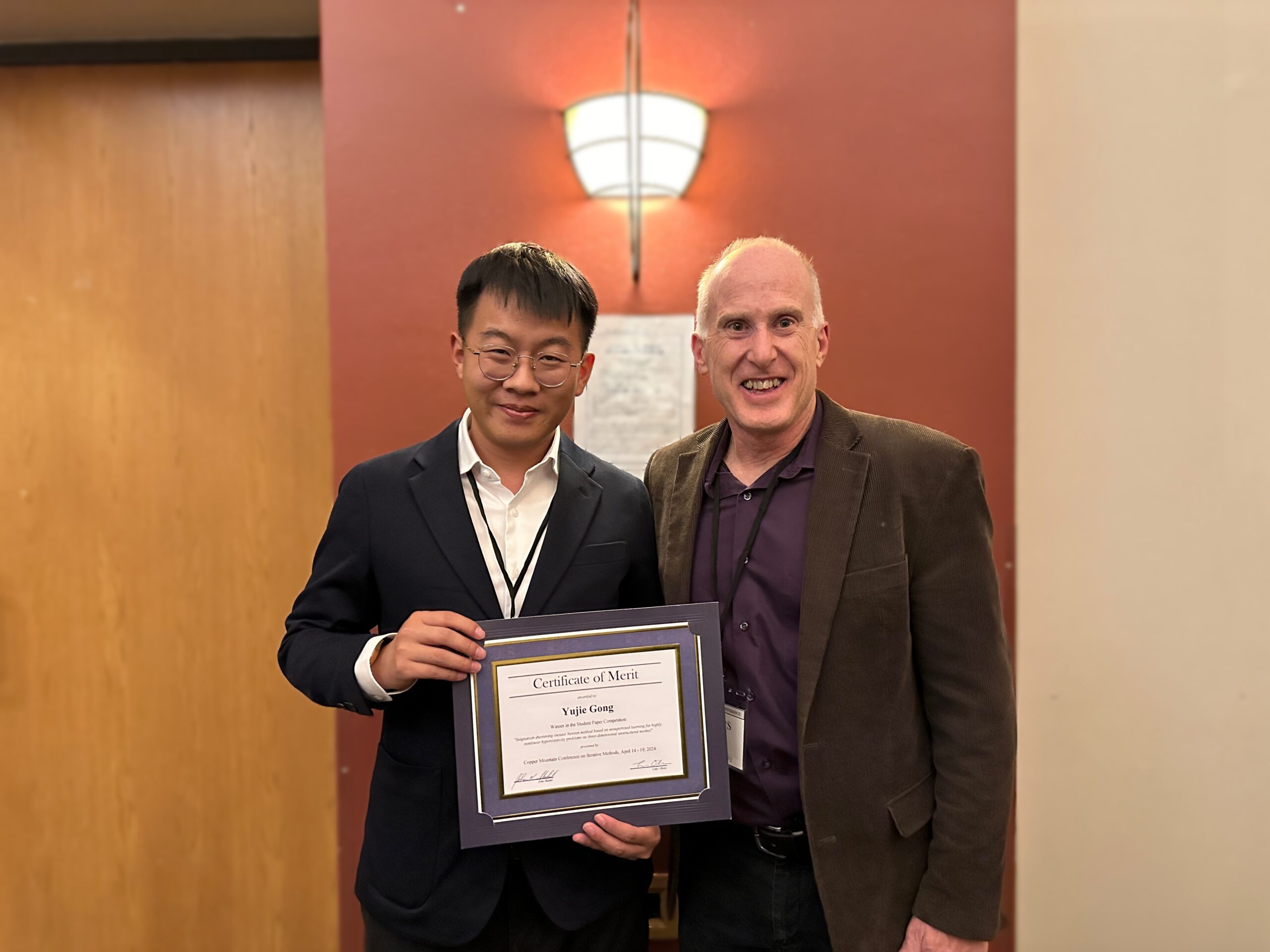Since its establishment over 40 years ago, CMCIM has been a prestigious academic event in the field of numerical computation and iterative methods. It is jointly organized every two years by the University of Colorado and the Society for Industrial and Applied Mathematics (SIAM), an internationally renowned academic organization and it is supported by the the US Department of Energy. It has developed into an important platform for scholars in the global mathematics community to exchange research results and promote academic progress. The conference took place from April 14th to 19th, 2024, in the United States. The award-winning paper by Ph.D. student Yujie Gong is titled “Stagnation-shortening inexact Newton method based on unsupervised learning for highly nonlinear hyperelasticity problems on three-dimensional unstructured meshes.” The paper was co-supervised by Prof Cai Xiao-Chuan and Prof Luo Li from the University of Macau.
Although the traditional inexact Newton method is widely used, it often encounters long stagnation periods when dealing with highly nonlinear problems, where the nonlinear residual does not decrease significantly, resulting in a significant waste of computational time. However, the reasons for this stagnation are often difficult to quantify. To address this, Yujie Gong, with the assistance of the supervising professors, proposed an innovative “stagnation-shortening inexact Newton method.” The method introduces a unique “stagnation analysis phase” where the norms of the residuals are used as a guiding curve, and the residual vector is decomposed into a slow subspace and a regular subspace. The research team applied unsupervised learning techniques based on principal component analysis (PCA) to perform subspace Newton calculations in the slow subspace, and the obtained solution is then projected back to the global space. Experimental results demonstrate that this embedded learning phase significantly improves algorithm efficiency.
As a practical application example, the paper selected the modeling of human arterial stenosis using the hyperelasticity equation with multiple material parameters. The model presents extremely high nonlinear complexity due to the significant differences in material coefficients between the plaque and the surrounding healthy blood vessel sections. Through numerical experiments, the proposed method successfully reduces the number of nonlinear iterations and exhibits excellent robustness in handling such challenging hyperelasticity problems, highlighting its great potential in practical applications.
This award will inspire more scholars to pay attention to the intersection of iterative methods and unsupervised learning and provide new insights for solving complex real-world nonlinear problems.
CMCIM自40多年前創立以來,一直作爲數值計算和迭代方法領域的學術盛會。每兩年由美國科羅拉多大學(University of Colorado )與國際知名學術組織工業與應用數學學會(Society for Industrial and Applied Mathematics, SIAM)聯合主辦,獲美國能源部支持,現已發展成爲全球數學領域學者交流研究成果、推動學術進步的重要平台。本次會議於2024年4月14日至19日在美國舉行。宮玉傑博士生的獲獎論文題為《基於無監督學習的駐點縮短非精確牛頓法解決三維非結構化網格上的高度非線性超彈性問題Stagnation-shortening inexact Newton method based on unsupervised learning for highly nonlinear hyperelasticity problems on three-dimensional unstructured meshes》,由澳門大學蔡小川教授和羅力教授共同指導。
傳統的不精確牛頓法雖廣泛應用,但在面對特定情况下的高度非綫性問題時,易出現長期駐點現象,即非綫性殘差幾乎不减少,導致計算時間被大量浪費。然而,造成這種駐點現象的原因往往難以量化。為此,宮玉傑在指導教授的協助下,創新性地提出了“駐點縮短非精確牛頓法”。該方法引入了一個獨特的“停滯分析”,以殘差範數的下降曲綫作爲指導,將殘差向量分解爲慢子空間和常規子空間。研究團隊通過應用基於主成分分析(PCA)的無監督學習技術,在慢子空間中進行子空間牛頓計算,並將所得解回歸至全域空間。實驗結果顯示,通過這種嵌入式學習,可明顯提高算法效率。
作爲實際應用示例,論文選取了使用多種材料參數對人體帶狹窄動脉進行超彈性建模。由於動脈狹窄部位的斑塊與周圍健康血管部分之間存在顯著的材料係數差异,該模型呈現出極高的非綫性强度。經過數值實驗驗證,所提出的方法顯著地减少非綫性迭代次數,並在處理這類相當困難的超彈性問題時表現出優異的魯棒性,展顯了新方法在實際應用中的巨大潛力。
是次獲獎可激發更多學者對迭代方法與無監督學習交叉領域的研究的重視,並為解決現實世界中的複雜非線性問題提供新的思路。

